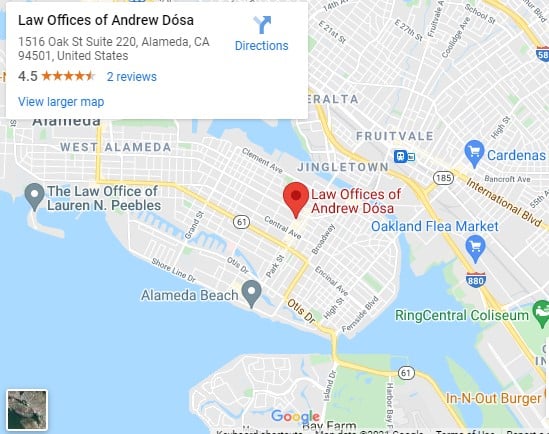Expungement Attorney in Alameda, California
After being found guilty, one of your greatest fears regarding criminal conviction is that your crimes will remain on your permanent record and affect the rest of your life. Unfortunately, having a criminal record can create barriers to employment, housing, education, and professional licensing because most employers and landlords now conduct background checks on applicants as part of the routine.
Depending on your case circumstances, you may get an arrest or conviction expunged from your record with the help of a skilled Alameda criminal defense attorney at the Law Office of Andrew Dosa. Get legal advice, explore your options, and clear your criminal record by scheduling an initial consultation with our legal team.
Why Do I Need an Expungement Lawyer in California?
You may have made mistakes in the past, but you’ve changed your life, and your criminal record is the only thing holding you back now. Having a previous conviction on your record can significantly impact your life. For this reason, expungement has become more common than ever before.
Clearing your record through expungement can be a complicated and time-consuming process. Since various laws dictate the types of charges eligible for expungement and who can have these convictions removed from your record, it is crucial to seek legal advice from a credible Alameda expungement lawyer. At the Law Office of Andrew Dosa, we have been helping countless people in Alameda County expunge their convictions. We believe you deserve a fresh start in life and will help you achieve it.
What is Expungement?
Expungement is sealing arrest, conviction, and related records from public access. It is a type of post-conviction relief in which the superior court reviews the sentence and allows the defendant to withdraw a finding of guilt or a plea. A “Not Guilty” plea is then entered, and the case is dismissed so the conviction can be set aside.
Every state has enacted laws that allow people to expunge arrests and convictions from their records. Most states allow that once an arrest or conviction has been expunged, it need not be disclosed, including to potential employers or landlords. In California, most misdemeanors and even some felony convictions can be expunged from your record with the help of a reliable Alameda expungement lawyer.
What are the Factors That Determine Eligibility for Expungement in California?
California expungement law allows many defendants convicted of crimes to have their criminal convictions dismissed in specific situations. However, not every individual convicted of a crime is eligible for expungement. Many factors determine the eligibility of a crime for expungement, and laws vary between counties and states.
Different state laws have different requirements that you must meet before an expungement can be granted or a record can be sealed. Whether you can get an expungement depends upon the offense for which you were convicted and the sentence imposed by the court. A knowledgeable Alameda criminal defense lawyer can help you determine your eligibility.
You can expunge a criminal record depending on the following factors:
Location
The availability and the process of expungement depend on the location of the criminal record. Each state has different laws and a list of crimes that can be expunged. The remedies and laws usually vary based upon the jurisdiction in which the arrest or conviction occurred.
Type of Offense
The type of offense and the severity of the crime are considered in determining eligibility for expungement. Repeat and serious criminal offenses are typically harder to expunge or seal. Some states will only consider misdemeanors as eligible for expungement but not felonies. Some jurisdictions limit eligibility to only non-violent offenses.
Age
Age is one of the most critical factors in determining the eligibility for expungement. California law allows young offenders to have their juvenile records sealed or erased if they get in no further legal trouble after a certain time. However, not all juvenile cases will be eligible. The eligibility will be based on the type of offense, location, and whether there were any previous offenses.
Outcome of Case
The availability of criminal record expungement depends on whether the person seeking to have their record expunged was convicted of a criminal charge or arrested for suspicion of committing an offense. In some states, a mere arrest record without a conviction is more likely to be expunged than an actual conviction.
Wait Period
Before requesting an expungement, some laws require a person to wait a certain amount of time after completing their sentence and remain crime-free. This means more than simply getting out of the state prison. In most cases, you must complete the terms of your sentence, including any period of probation, parole, or supervised release, to qualify for expungement.
What are the Charges that Qualify for Expungement in California?
State laws mostly dictate how the expungement process works and which crimes are eligible. A trusted Alameda expungement attorney can help you navigate the laws that determine the specifics of when you can get your records expunged.
In California, almost any criminal conviction can be eligible for dismissal. The only exception to this rule is if a court sentenced a defendant to a term in state prison due to their conviction. This type of punishment only applies to people who are convicted of felonies. Therefore, all misdemeanor-level offenses and violations may qualify for expungement. However, certain criminal offenses may never be dismissed from a criminal record. These include:
- Child pornography offenses
- Certain sexual crimes committed against a minor
- Certain types of severe traffic offenses
What Is the Process for Filing for an Expungement in California?
Generally, the expungement process starts when you file a petition with the court of conviction to get an expungement. In your petition, you should explain how you qualify and why you should receive an expungement. A judge will then set a hearing date to determine whether you are eligible for an expungement. A competent expungement lawyer in Alameda County could help file an appropriate petition, represent you in court, and argue why the judge should grant your request. If your request is granted, the judge will order reporting agencies and other enforcement agencies to seal your records.
The cost of filing an expungement petition in court varies from state to state. The filing fee can be expensive. However, some states allow the court to waive or reduce the payment if the petitioner can demonstrate financial hardship.
Call Our Seasoned Alameda Expungement Lawyers Now!
If your criminal record is expunged, the crimes will no longer be seen on background checks, giving you a second chance at a new start. The mistakes of your past shouldn’t have to hold back your future. You’ve turned your life around, so now it is time to clear your criminal record.
To expunge a record means you can live more freely, without worry that past legal hardship will follow you for the rest of your life. With legal representation from our experienced Alameda expungement attorneys at the Law Office of Andrew Dosa, we can help you take the necessary actions to reclaim your life. Our criminal defense law firm has helped many previous clients expunge their records and return to their lives after being convicted of a criminal offense. We will help you understand how the process works, determine if you qualify for expungement, and pursue a dismissal in Alameda County superior court.
Take the next step in clearing your name. Contact our law office now and schedule an initial consultation.
Why do I need an Assault and Battery Attorney in CA?
 It is often noted that assault and battery are like salt and pepper, one is a lot like the other and the two always go together. Given its nuanced nature, many quite confuse assault for battery.
It is often noted that assault and battery are like salt and pepper, one is a lot like the other and the two always go together. Given its nuanced nature, many quite confuse assault for battery.
To simplify its definition, assault is the act of placing fear in the victim with physical harm being imminent while battery is the act of physically harming the victim, thus completing the assault.
Assault and battery cases can be quite difficult to handle, which is why if you have been charged with an assault and battery case in California, it is best to get in touch with a criminal defense attorney from The Law Offices of Andrew Dosa.
The law office’s attorney has over two decades of legal experience in fields ranging from estate planning to criminal defense and is more than equipped to handle your case.
What is Assault and Battery?
The term assault has been repeatedly used and some may even confuse it with battery. While these two often go together, it is to be noted that they are quite different from each other. Assault is defined by the California Penal Code s.240 as an “unlawful attempt, coupled with a present ability, to commit a violent injury on the person of another”.
Battery, on the other hand, is legally defined in the California Penal Code s.242 as “any willful and unlawful use of force or violence upon the person of another”. To make it short, battery is the completion of assault since physical harm or force has already taken place.
Learn more about assault and battery, what penalties you stand to face, and how an assault and battery attorney can help you.
What are the Penalties for Assault and Battery?
Assault and battery can be charged as either a simple or aggravated case.
A simple assault charge is treated as a misdemeanor punishable by up to six months in county jail, $1000 fine, probation, plus restitution to the victim.
On the other hand, battery can be charged as either a misdemeanor or felony, depending on the nature of the alleged offense. As a misdemeanor, battery is punishable by six months in county jail and a $2,000 fine.
For a felony battery conviction, the maximum penalty is three years in prison, a fine of $2,000 to $10,000, probation, and restitution to the victims.
Note that penalties and sentencing for a convicted offender may vary depending on the severity of the crime, aggravating circumstances, and the criminal history of the defendant.
What are the Common Defenses Used in Assault and Battery?
The common defenses used in assault and battery include self-defense, defense of others, consent, and defense of property.
- Self-Defense: The most common defense used in assault and battery cases is self-defense. The defendant must show that there was a threat or unlawful force against them, there was a perceived harm, and there was no way to escape the imminent threat.
- Defense of Others: This kind of defense is starkly similar to the first, only it is to defend another person whom the defendant perceives is under threat of being a victim to assault and battery.
- Consent: Consent is an available defense in assault and battery charges, meaning that if an individual has given consent to an act then it cannot count as assault and battery. These are closely evaluated by courts and such harmful behaviors, even with permission, are still punishable under assault and battery laws.
- Defense of Property: This can be used as a defense in situations wherein one’s property is being illegally withheld from them.
Call our Assault and Battery Attorney Now!
Assault and battery are serious cases that can pose grave punishments when convicted. Regardless, if you are facing charges for assault and battery, know that it is within your rights to have an attorney.
Enlist the help of a criminal defense lawyer from the Law Offices of Andrew Sosa. An assault and battery attorney with over two decades of experience can inform you of your rights, represent and defend you in court, and ensure that you get the best possible outcome for your cause.



